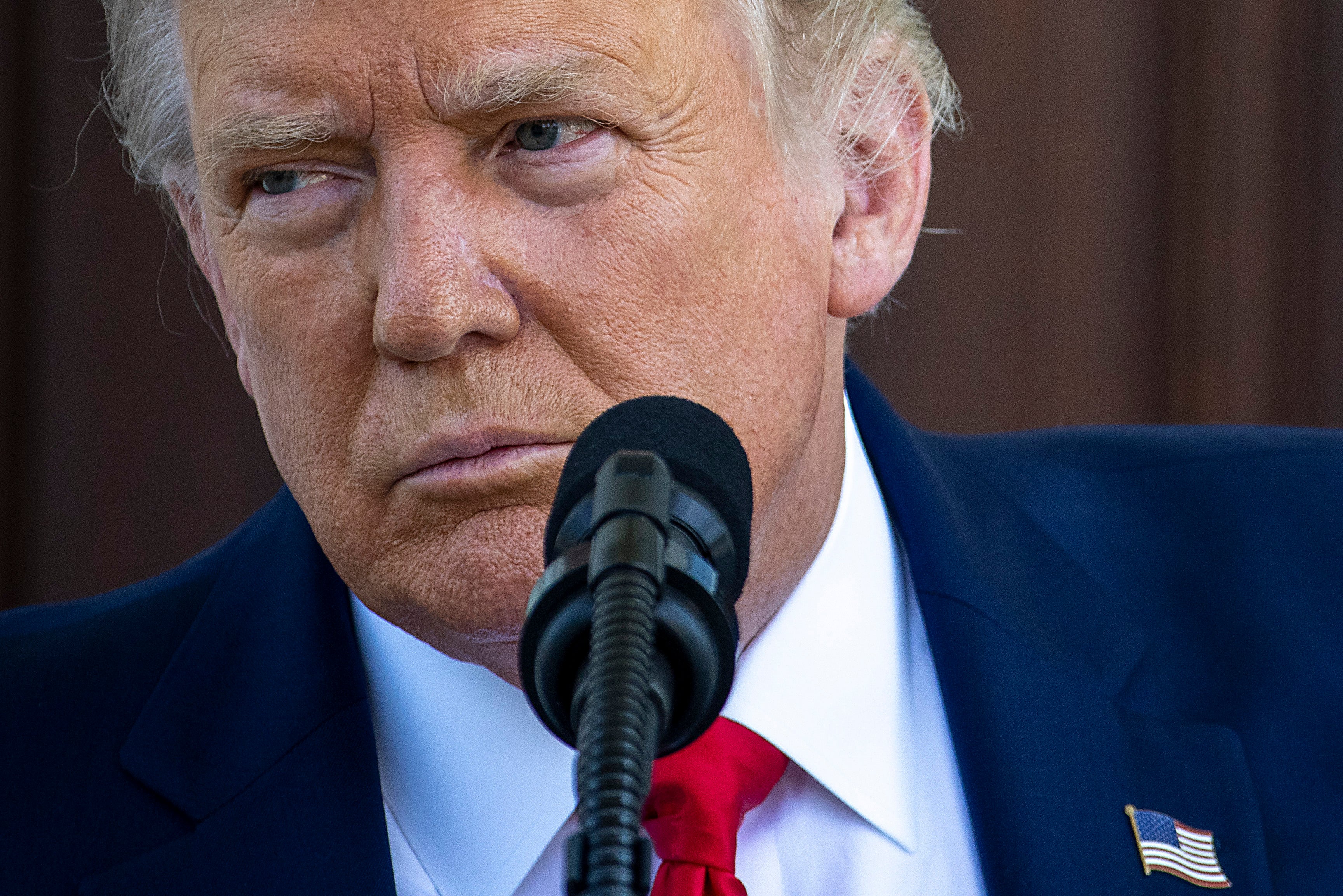Trump is running on the American economy, but his critics say he's selling a mirage
The president wants credit for a recovery his critics say was made necessary by his own Covid-19 mistakes. Both sides have valid points, meaning it’s up to voters to decide who is more right, writes Washington Bureau Chief John T Bennett


Donald Trump, it turns out, is running on the economy after all. But his critics say what the president is selling voters is more mirage than reality.
He returns to the campaign trail in earnest this week, with stops in at least three battleground states: Florida, North Carolina and Michigan. (On Friday, he and Democratic nominee Joe Biden will be in another, Pennsylvania, but to commemorate the anniversary of 9/11 in Shanksville, where United Airlines Flight 93 crashed after being hijacked by al-Qaeda operatives.)
Mr Trump ran in 2016 as a self-described business savant who told voters he was – despite no formal training as an economist – uniquely qualified to supercharge what was a slow-but-steady economic recovery under the Obama administration following the 2007-2008 global recession. Economic growth did take off in the early quarters of his term, but it eventually slowed to an Obama-like pace.
The president early this year was poised to ask voters a simple-but-powerful question: Are you better off financially than you were four years ago? By all accounts, the answer – especially among the educated suburban voters analysts say will largely decide the election – was yes.
The unemployment rate in February, just before the coronavirus began spreading here, was around 3.5 per cent. US stock markets were roaring to record highs, meaning voters' investment accounts and retirement funds were robust.
Why, voter, would you want to change economic captains when the USS Economy is steaming full speed ahead in smooth waters? That was supposed to have been Mr Trump's main ingredient – with accompanying dashes of terrorist group leaders taken out on his orders and the threat of a socialist takeover of the United States, should the Democratic nominee win in November.
Then came the coronavirus.
US stock markets had some rough days, but have mostly continued to post high values. But the American worker has not fared as well.
Unemployment skyrocketed to a high of 14.7 per cent in April, with tens of millions of people losing their jobs during the coronavirus. Democrats, including Mr Biden, have pinned the bleak situation on the president himself, saying his initial dismissal of the seriousness of the virus and subsequent handling of the crisis cost some people their paychecks and others their lives.
But as summer fades into autumn and the 2020 campaign heads down the homestretch, there are enough positives on the economic and jobs fronts for Mr Trump to supplement his law-and-order campaign message.
After all, the unemployment rate last month dropped to 8.4 per cent (from 10.2 per cent in July), with nonfarm payrolls increasing by 1.37m, according to the Labor Department. Those figures beat expectations. A survey of economists by Dow Jones found an expected 1.32m growth rate and the unemployment rate to fall to 9.8 per cent.
‘Super V’ recovery?
That's why Mr Trump used part of a wide-ranging Monday press conference to talk up an economy he says is zooming back to its pre-Covid levels. So confident in the trends is the president, he is now telling voters only he can generate a "super V"-shaped economic growth rate.
"Under my leadership, next year will be the greatest economic year in the history of our country, I project. And some people are starting to agree. We have a 'V' shape. It's probably a 'super V,'" he said on Monday. "And you see what's going on with the stock market, where it's, in certain cases, already setting records. NASDAQ has set 17 records already, and this is as we're, hopefully, rounding the final turn in the pandemic."
The NASDAQ opened Tuesday trading, however, down 3 per cent on worries about technology stocks after the president over the weekend suggested the US and Chinese economy should get a divorce. He is unhappy with Beijing's handling of the coronavirus, which went public on their soil, and the Chinese government's slow – and predictable – back-away from a trade deal it struck with Mr Trump's team last year.
But the president appears to be taking a long term view of the stock market and economic trends less than two months before Election Day.
"The United States experienced the smallest contraction of any major Western nation [since the Covid outbreak began]," he told reporters. "You look around and see how we're doing compared to every other nation, and our rise is spectacular. And we're rebounding much more quickly from the pandemic.
"In July, the Congressional Budget Office was projecting unemployment over 10.5 per cent through the end of 2020. So they thought 2020, and maybe it would be a lot longer than that, some projections, where you'd go through the entire year, and that includes a lot of months in the following year, 2021," he said in a meandering economic summary that mirrored much of the extremely rare North Portico press availability.
"And instead, the unemployment rate plunged, really, to the surprise of many, all the way down to 8.4 per cent in August. And that's the second-largest single month decline on record. And we have the first; we have both of them," he claimed in full campaign mode outside the White House's front door. "We're currently witnessing the fastest labour market recovery from an economic crisis in history – world history."
Expect that line to be a big part of his now-revived campaign rallies as he hits the trail hard trying to close in on Mr Biden. Numerous polls show he is still behind Mr Biden in the four states he will visit this week, though he has closed some ground in recent weeks in several battlegrounds.
'Working for you?'
He also will make the case that the Obama administration did not grow the American economy fast enough following the “Great Recession.”
Mr Trump essentially wants credit for an economy that is coming back from its lowest point in a generation, while ignoring mistakes experts and Democrats say he and his team made.
But Mr Biden and his surrogates will counter Mr Trump's economic message.
The former vice president and his team have echoed some economists who say the recovery is more shaped like a "K" than a "V."
"Folks have to ask themselves: Is this recovery working for you?" Biden campaign senior adviser Symone Sanders told Fox News Sunday, adding: "It is going well, going up for folks at the top, but for folks who are middle class or below, it is going down."
Mr Biden offered his own version of that line as he was on the campaign trail in Pennsylvania on Monday, telling voters in Lancaster that the president is "refusing to deal with the problems that affect ordinary people."
The battlelines on the economy are being drawn, with White House chief economic adviser Larry Kudlow on Tuesday contending those are just the people the ongoing economic comeback is helping. Both sides will press facts to the limit, meaning it will be up to voters to decide.
"This idea that there are no low end jobs being created. Okay, so the typical low wage areas, leisure and hospitality, so ... restaurants and hotels, retail trade, and small stores and healthcare: 7m of the nearly 11m jobs created in the last four months have been, quote, 'lower end,'" he told reporters at the White House. "The biggest wage gains from the [2017] tax cuts pre-pandemic were from the middle and lower end of the income spectrum. And once again, the biggest job gains we're seeing are coming from the middle and lower end of the job spectrum."
Join our commenting forum
Join thought-provoking conversations, follow other Independent readers and see their replies
Comments



Bookmark popover
Removed from bookmarks